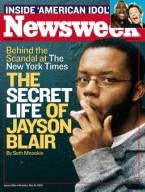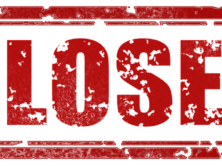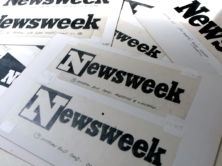
Newsweek's May 2004 press release said: "In the May 26 issue...Newsweek tells the tale of the 27-year-old New York Times reporter who faked interviews, lifted quotes and made up scenes during his tenure at the Times." (Source: [PRNewsFoto][KO]NEW YORK, NY USA).
Usually young journalists learn their ethical lessons from the paragons of good behavior–role models whose writing and conduct embody the highest regard for responsible reporting. But in the spirit of the opposite kind of lesson–learning from someone else’s mistakes–a group of students will be taking some pointers from one of the most famously unethical journalists of the 21st century next month–disgraced former New York Times reporter Jayson Blair.
Blair is scheduled to be “the featured speaker” at Washington and Lee University’s 48th Journalism Ethics Institute on Friday, Nov. 6 according to the university’s website. The Rockbridge Weekly, a local weekly paper reprinting the same announcement writes, “The title of Blair’s talk is ‘Lessons Learned’. The public is invited to the presentation at 5:30 p.m. in Stackhouse Theater, Elrod Commons.”
Considering Blair’s ethical history, this announcement almost sounds like another media hoax to add to the growing list we’ve encountered in recent weeks.
In 2003, Blair came under fire for the similarities between a story he had written for the New York Times and one by a reporter at another newspaper. Unable to prove that he’d actually reported the story, Blair resigned from the New York Times on May 2, 2003. A committee later determined that approximately half the stories Blair had written for the New York Times since 2002 had problems ranging from plagiarism to outright fabrication. The Times publicly apologized for the Blair scandal in this front-page story on Sunday, May 11, 2003.
The Washington and Lee University website reports:
“Inviting Jayson Blair to keynote this institute was definitely a departure for us,” said Edward Wasserman, the Knight Professor of Journalism Ethics at W&L “In the past, we’ve brought heroes to Lexington, people of great accomplishment and stature, such as Hodding Carter, Helen Thomas and Lowell Bergman, and people who stood up to pressure in the name of principled journalism, such as Matt Cooper and my W&L faculty colleague Toni Locy, both of whom faced jail time because they refused to give up the names of sources they had promised to protect.
“Jayson Blair, on the other hand, was at the center of one of the signature journalism scandals of this still-new century, and there’s no way to imagine that his role in it was heroic,”
Despite this, the university still sought Blair out to speak at the conference, expecting, perhaps, that the former journalist would be able to offer some words of warning to its students. “Do as I say, not as I do,” for instance.
“My expectation is that he’ll talk not just about his own susceptibilities, but about the pressures and temptations that might induce ambitious and talented young journalists elsewhere in the business to do the wrong thing,” Wasserman says in the W&L article
Blair, apparently, has been working for the last two years as a certified life coach “specializing in attention deficit disorder, pervasive developmental disorders, mood disorders and substance abuse disorders,” according to the W&L report.
Wasserman says that “[Blair] said that although he has not spoken publicly about the affair that led to his dismissal from the New York Times, this might be the right time and right occasion.” But Blair actually has spoken publicly about his dismissal. And some of what he has said certainly calls into question his appropriateness as a lecturer on ethics.
Blair talks about the controversy here on CNN’s Reliable Sources, but also most notably in his own autobiography, Burning Down My Masters’ House.
Publishers Weekly reviewed the book in 2004, writing “While he claims to take responsibility for his actions, he swipes steadily at the Times and its ‘callous’ managers, and at its ‘end-justifies-the-means’ environment, where he was treated like ‘a rag doll’… His rancor, his excuses and his predilection for payback undermine the integrity of his admissions and apologies… It may be that what we read in this fierce, self-indulgent, self-aggrandizing volume is truth, albeit one man’s version; it may also be that once again the author is hiding out, as it were, weaving fairy tales that we buy at our own risk.
Blair was even interviewed in a 2004 Newsweek cover story. Their PR Newswire press release states:
In an exclusive conversation with Newsweek, Blair spoke of his feelings since his career went up in flames: “I can’t say anything other than the fact that I feel a range of emotions including guilt, shame, sadness, betrayal, freedom and appreciation for those who have stood by me, been tough on me, and have taken the time to understand that there is a deeper story and not to believe everything they read in the newspapers.” Or so Jayson says. As the Times found out the hard way, where Blair is concerned, it can be exceedingly difficult to determine just where fact leaves off and fiction begins, writes Senior Writer Seth Mnookin in the May 26 Newsweek cover story.
Wasserman said in an email to StinkyJournalism that he should have clarified in the report that Blair hasn’t spoken about it in the past five or six years.
The question has been raised in these 2004 accounts as to whether Blair can be expected to speak honestly about anything, even his own dishonestly. In that light, though his history might serve as a good warning to Washington and Lee students, the unreliable nature of his testimony might mark him as a bad choice to lecture on ethics.
For those who want to go further and refresh their memory about the Blair case, Alan Bisbort, a journalist and non-fiction author, wrote about the Blair case in his book, Media Scandals. An excerpt that deals with the issues raised by the case is reproduced below with permission:
From Media Scandals by Alan Bisbort, Greenwood Press, 2008
The Jayson Blair scandal rocked the New York Times’ newsroom like no other scandal before it, leading to the resignation of top executives, including Executive Editor Howell Raines, who’d championed the young reporter. Blair came to the paper as a college intern in 1998, was hired as an intermediate reporter in 1999, then a full-time staff reporter in Jan. 2001.
Despite concerns about his sloppy reporting by his Metro section editors, Blair was promoted the next year to the national desk, where his problems resurfaced when he was assigned to the “Beltway sniper” story. During the weeks that the Washington D.C. suburbs were terrorized by snipers, Blair filed more than 50 stories. Many contained glaring errors and misquotes; complaints about his work were regularly filed with Times editors. Nonetheless, Blair was kept on the beat.
However, the ample warnings about Blair were proven true in April 2003, when he was caught plagiarizing large chunks of a story by Macarena Hernandez of the San Antonio-Express-News. Blair resigned from the Times on May 2, 2003. An investigation of the nearly 600 articles he had written for the Times discovered many were “suspect.” Specifically, 36 of the 73 stories he wrote on the national desk contained fabrications and plagiarisms.
Also, he filed many stories from out of town, though he seldom left New York. Hoping to forestall further disgrace, the Times ran a front-page confession of Blair’s “long trail of deception” and referred to it as “a low point in the 152-year history of the newspaper.”
In a book published the following year, Blair—who is black—blamed racism, drugs and “bipolar disorder” for his mistakes. Blair implied that he wasn’t the only reporter who did what he did, which only further shamed the Times, even if it too was a lie. Blair wrote, “I lied about where I had been, I lied about where I found information, I lied about how I wrote the story. And these were no everyday little white lies—they were complete fantasies, embellished down to the tiniest made-up detail…In the end-justifies-the-means environment I worked in, I had grown accustomed to lying.” Blair founded Azure Entertainment in 2003 to “handle a number of publishing projects.”






Comments Terms and Conditions